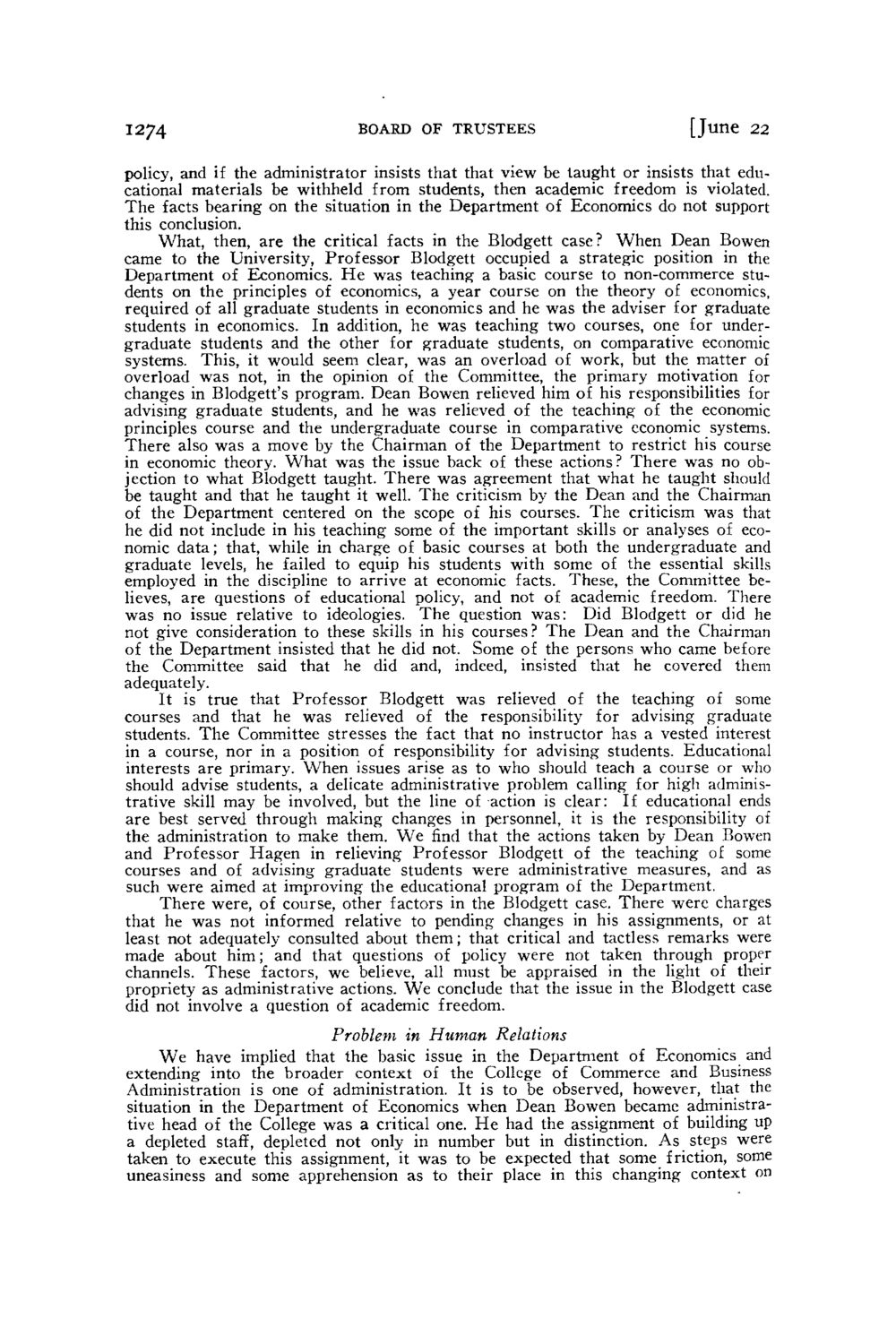| |
| |
Caption: Board of Trustees Minutes - 1950
This is a reduced-resolution page image for fast online browsing.

EXTRACTED TEXT FROM PAGE:
1274 BOARD OF TRUSTEES [ J u n e 22 policy, and if the administrator insists that that view be taught or insists that educational materials be withheld from students, then academic freedom is violated. The facts bearing on the situation in the Department of Economics do not support this conclusion. What, then, are the critical facts in the Blodgett case? When Dean Bowen came to the University, Professor Blodgett occupied a strategic position in the Department of Economics. H e was teaching a basic course to non-commerce students on the principles of economics, a year course on the theory of economics, required of all graduate students in economics and he was the adviser for graduate students in economics. In addition, he was teaching two courses, one for undergraduate students and the other for graduate students, on comparative economic systems. This, it would seem clear, was an overload of work, but the matter of overload was not, in the opinion of the Committee, the primary motivation for changes in Blodgett's program. Dean Bowen relieved him of his responsibilities for advising graduate students, and he was relieved of the teaching of the economic principles course and the undergraduate course in comparative economic systems. There also was a move by the Chairman of the Department to restrict his course in economic theory. What was the issue back of these actions? There was no objection to what Blodgett taught. There was agreement that what he taught should be taught and that he taught it well. The criticism by the Dean and the Chairman of the Department centered on the scope of his courses. The criticism was that he did not include in his teaching some of the important skills or analyses of economic data; that, while in charge of basic courses at both the undergraduate and graduate levels, he failed to equip his students with some of the essential skills employed in the discipline to arrive at economic facts. These, the Committee believes, are questions of educational policy, and not of academic freedom. There was no issue relative to ideologies. The question was: Did Blodgett or did he not give consideration to these skills in his courses? The Dean and the Chairman of the Department insisted that he did not. Some of the persons who came before the Committee said that he did and, indeed, insisted that he covered them adequately. It is true that Professor Blodgett was relieved of the teaching of some courses and that he was relieved of the responsibility for advising graduate students. The Committee stresses the fact that no instructor has a vested interest in a course, nor in a position of responsibility for advising students. Educational interests are primary. When issues arise as to who should teach a course or who should advise students, a delicate administrative problem calling for high administrative skill may be involved, but the line of action is clear: If educational ends are best served through making changes in personnel, it is the responsibility of the administration to make them. W e find that the actions taken by Dean Bowen and Professor Hagen in relieving Professor Blodgett of the teaching of some courses and of advising graduate students were administrative measures, and as such were aimed at improving the educational program of the Department. There were, of course, other factors in the Blodgett case. There were charges that he was not informed relative to pending changes in his assignments, or at least not adequately consulted about them; that critical and tactless remarks were made about him; and that questions of policy were not taken through proper channels. These factors, we believe, all must be appraised in the light of their propriety as administrative actions. We conclude that the issue in the Blodgett case did not involve a question of academic freedom. Problem in Human Relations W e have implied that the basic issue in the Department of Economics and extending into the broader context of the College of Commerce and Business Administration is one of administration. It is to be observed, however, that the situation in the Department of Economics when Dean Bowen became administrative head of the College was a critical one. H e had the assignment of building up a depleted staff, depleted not only in number but in distinction. As steps were taken to execute this assignment, it was to be expected that some friction, some uneasiness and some apprehension as to their place in this changing context on
| |